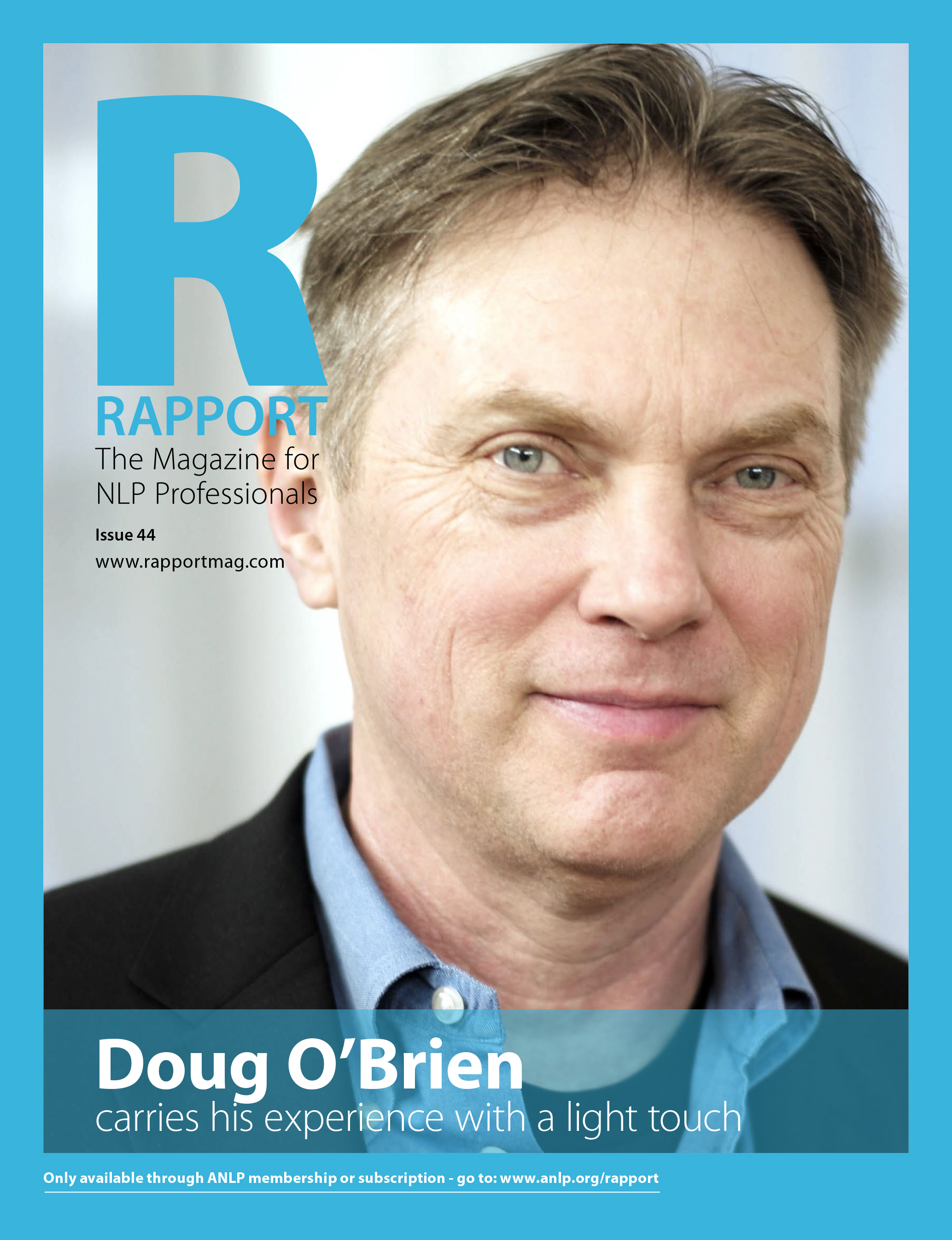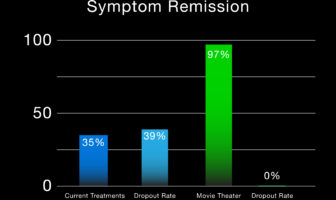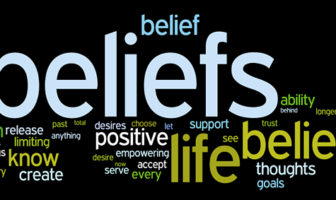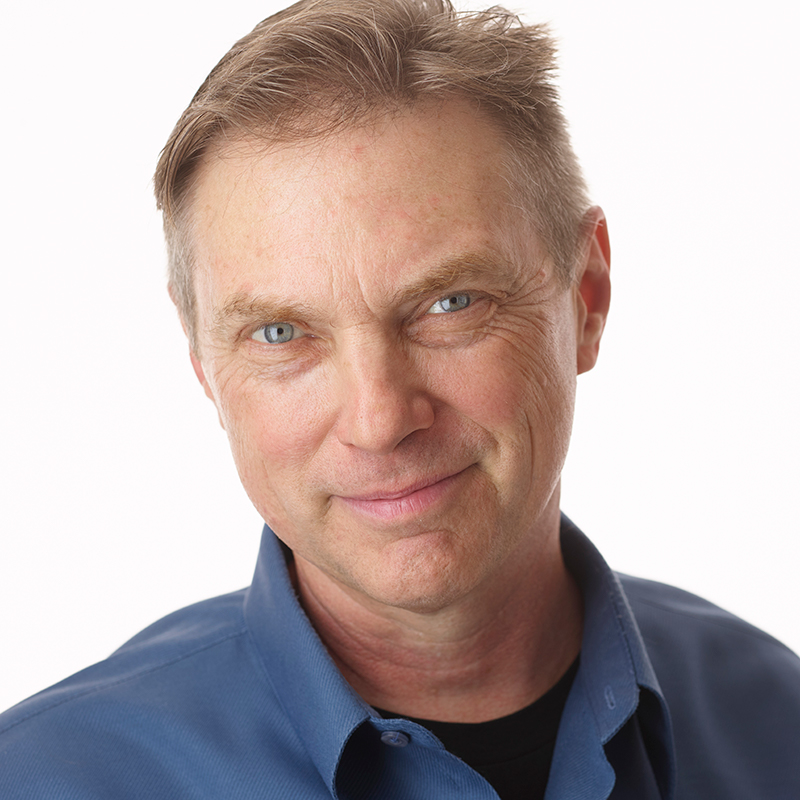
Rapport Magazine article on Doug O’Brien
RAPPORT magazine is published by ANLP International. It is part of membership benefits and also available by subscription. Individual issues can also be bought. www.anlp.org/Rapport.
Written by Andy Coote
Doug O’Brien
carries his experience with a light touch
From Carnegie Hall and Studio54 to Sleight of Mouth, by way of Tony Robbins and Robert Dilts, our interviewee this issue carries his experience with a light touch. Doug O’Brien is a quiet and polite man with a wicked sense of humour. He spoke to Andy Coote a few weeks after co presenting ‘Tales from the Outside Inn’ with Nick Kemp in Leeds.
Doug O’Brien first came to the UK from New York in the 1970s when he spent a year at the Guildhall School of Music and Drama studying piano and musical composition. After College, Doug’s career took him to the Carnegie Hall where he played a concert, then, changing musical genres he pursued a career in rock and roll, playing in punk rock bands. ‘I played places like CBGB, Studio 54 and The Red Parrot. So from 1980 until about 1986 I was playing in bands in New York, earning money by playing parties, cocktail lounge piano and teaching piano.’
In 1985, encouraged by a friend, Doug went to his first NLP Seminar with Tony Robbins. ‘Tony was not just talking about fire walking and it wasn’t just about rah-rah stuff. The backbone of it was NLP which absolutely fascinated me. I found I could teach better, make myself a better performer, a better marathon runner. In fact one of my ebooks, Step up to Mastery with E.A.S.E, is really based on that process of how to apply NLP skills to learning and mastering anything.’
Doug realised that there was potential to use NLP more widely. ‘I started doing little things like helping a guy in my band quit smoking and it worked. People started saying hey, could you help my friend and saying how much do you charge? I realised I could actually earn money doing this thing.’
And earning was important. Moving from being a musician into developing a career in NLP was, Doug suggests, easier than for some other transitions. ‘I was kind of blessed as far as building a career in NLP is concerned that I started off as a musician – which is to say I was poor, and replacing my musical career with
an NLP career wasn’t a step down. I had a student once who was a legal secretary who hated her job. As soon as she got her NLP diploma she quit her job and hung out the shingle as an NLP Practitioner and within about six months had used up her savings and went back to being a legal secretary, because it’s not that easy. I was used to being poor for a long time so I had the time to let it build.’
From 1980 until about 1986 I was playing in bands in New York
Whilst getting his Practitioner certification from Tony Robbins, Doug met, and was trained by, Wyatt Woodsmall, Robert Dilts and Richard Bandler. Richard Bandler and Robert Dilts led Doug to one of his key areas of study and teaching. ‘Sleight of Mouth is Robert Dilts’s model of Richard Bandler’s persuasion skills. Wyatt introduced a teaser of what sleight of mouth could be at a Tony Robbins Trainer session and I was fascinated by it. Then a close friend of mine took a Robert Dilts seminar and came back and was amazingly changed in her persuasiveness. I took my Master Practitioner training from Robert and from his partner and co-developer Todd Epstein. On my return, I taught Sleight of Mouth to the Tony Robbins trainers who had had the Wyatt teaser session. It was such a successful little weekend that I developed it into the seminar that I still teach to this day. You don’t have to know anything about NLP to become very persuasive with Sleight of Mouth – and life is about persuasion.’
Meeting Dr Dave Dobson – again through Tony Robbins – led Doug into Hypnosis and then into Ericksonian Hypnosis. ‘He was a bearded burly guy and had a slow way of talking. He was funny but he was very different. His stories were hilarious and the points they were making were really interesting. I felt bad for him because everybody in the audience kept falling asleep during the seminar and then it occurred to me that he was doing that on purpose. He did a trance induction he called the Beach Trip with the whole group. I was impressed because I remember him starting talking and then half an hour later or so I woke up and like, where was I? That got my attention.’
Doug heard from others about what Dobson called his ‘fun shops’. ‘My NLP skills were enhanced because I went out and was in trance with this guy for a couple of weeks. Dobson and Erickson were sort of contemporaries. Dobson was a bit younger and developed his style of doing hypnosis separately and in parallel with Erickson. There was a lot of storytelling, a lot of what Dave calls “other than conscious” communication. I asked Dave if there were any good books and he said no. He was very protective of his stuff and worried that people were stealing it from him. It seemed like everybody in the NLP world who was really good at NLP could also do Ericksonian hypnosis, like Woodsmall and Bandler and those guys. Bandler talked about Erickson all the time. So I decided I really wanted to delve into Ericksonian hypnosis and that’s what I did. Within Ericksonian hypnosis you’re going to get a wide variety of approaches to it. Milton Erickson taught without ever directly answering a question. If somebody said “well how about how do you do this Dr Erickson” he’d say, “well, you know, when I was a young boy I used to ride horses”. And he’d tell a story. All these Ericksonians came away from there with very different viewpoints of what it was that he was doing.
So if you study Ericksonian with Gilligan you get a Gilligan approach, with Steve Langton you get a Langton approach, with O’Hanlan you get an O’Hanlan approach. Frankly, when I teach it now I call it neo-Ericksonian hypnosis because it think it’s more accurate. Erickson’s been dead for, what … 40 years now? I learned it from his pupils and from a variety of sources.’
I asked Doug about the importance of stories. Allow them to be told or intervene? ‘One of the things that
I learned from Dave Dobson is not let them get stuck
in their story and to use humour to interrupt the story. That’s something that Frank Farrelly and Dave Dobson both did brilliantly. We think in stories and we dream that way, too. Stories are something we can understand. We put ourselves in the place of the lead character and we see it from their viewpoint. If I just said to you something like “well that’s just sour grapes”. You would know what I am talking about. Aesop’s fables were teaching tales some 2,500 years ago and are still with us – teaching people how to live day to day through the stories that they remember.’
Working in NLP allowed Doug to develop a respect for the individual’s own personal process
Working in NLP since the 1980s has allowed Doug to develop what he describes as a respect for the individual’s own personal process. ‘It really bothers me when I hear people say, I did an NLP process and I fixed them. You do not fix them. You’re giving them an opportunity to fix themselves, to change something about themselves, but you’re never actually fixing somebody else. A story gives them an opportunity to think differently and if they’re moving even just a little bit differently at the end of the session, down the road that can be a huge change. When I’m doing a session with someone, there are things that they can put their finger on and say, this is what we did today and while they’re doing this worksheet or whatever it might be, part of their mind is, subconsciously, still playing with that story that I told them.’
The power of physical positioning and perceptual positions is an area the Doug uses in his training and in his personal life. ‘I regularly do what my late friend and co-trainer Kevin Creedon called the self-coaching strategy. It’s a triangle of positions. The first position you’re in yourself and you ask yourself, this week, or this job or whatever, how did I do? What did I do that was good? What did I do that was productive? And how can I make it better? Then you step out of yourself and go to a second position and look back at yourself and say okay, what did he do this week that was really good? What can he do to make it better? Then you’d move to the third position, a mentor position. You step into somebody else’s body who again is looking at you from their perspective and saying what did he do that was good? How can he make it better? Same questions, but now you’re standing in the body of Milton Erickson or Tony Robbins or whoever you want it to be that particular day. I do this self-coaching strategy every week and often with the same mentor and I always learn from them.’
Having knowledge products is clearly a good strategy from a business point of view. People can learn at their own speed and, as a teacher, you are freed from the limitations of selling your time. ‘In a business you need to have more than one channel of making money. So I do teaching of seminars, I do product creation, I do on the telephone coaching and I do one-to-one sessions. NLP is a communication skill so it’s very difficult to really get that from just a book. But books are great enhancements once you’ve had an experience. You learn face-to-face, you learn from a group situation. In a group situation I think you often learn as much from the others in the group as you do from the teacher up front.’
It can be, however, hard to master the complexities of producing good products. ‘When I first taught Sleight of Mouth I had it audio and videotaped. I had those audios available as a set of cassette tapes, but they never really worked that well because during the seminar somebody would ask a question without the microphone or something else would happen that was not clear onmthe tapes. So, finally, I went into a studio and imagined that I was teaching the seminar to a person sitting there at the desk with me and taught the course into the microphone. That took me I don’t know how many years to finally get done into that form. Then after that was done, I thought why don’t I make a book out of this, it would be very simple. I’ll just have the CDs transcribed and put the illustrations from the workbook in there and I’d have a book. It was not that simple. I discovered I don’t speak in full sentences. The way I talk, makes a lot of sense when I say it out loud, but not when it’s in the written word. So I had to completely redo that thing. It took me a year or more to finally get that thing done. I moved things around, David Gordon gave me some invaluable advice for it and he actually almost re-edited the thing for me.’
I’ve had the pleasure of learning with and from
Doug O’Brien. He is a very influential man and a great storyteller yet always approachable and keen to help and support. I hope I’ve done him justice here.
– Andy Coote, May 2015





 Download Doug O’Brien’s paper,
“Be your Best with Self Hypnosis”
Download Doug O’Brien’s paper,
“Be your Best with Self Hypnosis”